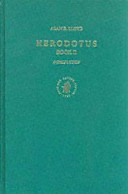
Herodotus: Introduction PDF
Preview Herodotus: Introduction
HERODOTUS BOOK II INTRODUCTION ETUDES PRELIMINAIRES AUX RELIGIONS ORIENTALES DANS L'EMPIRE ROMAIN PUBLIEES PAR M. J. VERMASEREN TOME QUARANTE-TROISIEME ALAN B. LLOYD HERODOTUS BOOK II INTRODUCTION LEIDEN E. J. BRILL 1975 ALAN B. LLOYD HERODOTUS BOOK II INTRODUCTION LEIDEN E. J. BRILL 1975 ISBN 90 04 04179 6 900404181 8 Copyright 1975 by E. J. Brill, Leiden. Netherlands All rights reserved. No part of this book may be reproduced or translated in any form, by print, photoprint. microfilm, microfiche or any other means without written permission from the publisher PRINTED IN BELGIUM VIRO DOCTISSIMO DEQUE HIS STUDIIS OPTIME MERITO J. GWYN GRIFFITHS MAGISTRO DISCIPULUS CONTENTS Preface IX Abbreviations XIII I. The Greeks in Egypt from the Bronze Age to the Time of Herodotus 1 II. Herodotus' Travels in Egypt 61 III. Sources . 77 IV. Herodotus' Attitudes and Intellectual Affinities 141 V. Chronology. 171 PREFACE Undertaking a commentary on Herodotus Book II is an act of hybris but an act of hybris long overdue. The last substantial treatment was that of Wiedemann published in 1890 but, excellent though it was, so much water has flowed under the bridge since then both in Classics and Egyptology that in many respects it has long been outdated. This is all the more lamentable because for both disciplines Book II of Herodotus' Histories is a text whose importance it would be difficult to overestimate. Nowhere does Herodotus the man emerge so clearly. Nowhere do we get so revealing a picture of the intellectual world ol the early and mid Fifth Century B.C. Furthermore, it is the most substantial early ethnographical ;\6yos which we possess and, therefore, provides invaluable insight into the nature of this extremely important and influential branch of Ionian science. It is also the most extensive and most important of all classical accounts of Egypt and has a crucial effect in orientating and conditioning all later responses to the land of Egypt, be they Greek or Roman. On the Egyptological side the value of the work is at least as great, though sadly Egyptologists are all too ready at times to decry its im- portance. It provides the first extant eyewitness account of Egypt written by a European with very much the same interests as a modern western scholar. We are, therefore, presented with a response to and a description of what was actually there in the Fifth Century. Native Egyptian texts and representations, on the other hand, though fre- quently voluminous, are characterized by a degree of stereotyped obsolescence which often makes them very dangerous evidence indeed for the reconstruction of contemporary Egyptian life. Herodotus' in- formation on matters ethnographicis, consequently, all the more precious. On a host of problems he provides invaluable information - food, clothing, ship-building, housing, burial customs etc. On the historical side he supplies the basis of all our accounts of the history of the period from the reign of Psammetichus I. What a sparse, threadbare narrative we should have were it not for his forty chapters on the subject! In some respects even more precious is the fact that he enables us to x PREFACE discern the very image of the past which was current amongst the majority of Egyptians themselves. Such documents are not to be regarded as peripheral to the Egyptologist's studies. Herodotus - and the same holds true for Diodorus Siculus, Strabo and their fellows - constitutes an indispensable part of our source material both for the study of the physical context of Egyptian civilization and for divining and grasping its intellectual and spiritual content. The latter, it must be admitted, the Greeks often failed to understand, but their response itself is fre- quently immensely instructive. The study of a work of such range presents many problems and demands not a few compromises. As far as methods and aims are concerned, my basic intention has been to produce the sort of commen- tary on Book II which I have always wanted myself i.e. a commentary which concentrates on isolating the problems and attempting to give some indication of where the solutions may lie. Consequently, I have frequently dispensed with exhaustive bibliographies and detailed dis- cussions of the views of other scholars, which often do little but confuse the issues in question, and have confined myself to what I regarded as essential to the fulfilment of this purpose. As for references, those within the commentary will perhaps appear laconic compared with those in the Introduction but considerations of space demanded that they should be as brief as was consistent with clarity. Used with the Bibliography which will appear in the third volume they should present no difficulty. In this attempt to satisfy a long felt need I have not been entirely without assistance. I should like to express my thanks to Mr. Russell Meiggs and Professor A. F. Shore who examined this work in an earlier form as a D. Phil. thesis of the University of Oxford and whose forthright criticism was of great value in removing the more crass errors and misconceptions. Above all, however, thanks are due to two scholars. It was with Professor J. Gwyn Griffiths of University College, Swansea, that I first read Book II as a student and it was at his sugges- tion that this study was undertaken. His advice and probably unequalled experience of the material have been a constant source of encouragement and stimulus. I also owe an incalculable debt to Mr. W. G. G. Forrest of Wadham College, Oxford who supervised my work as a research student over a period of some seven years. His influence on my thinking
